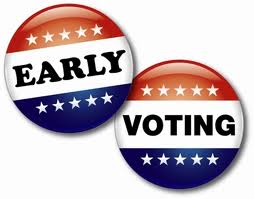The Chron provides five takeaways from early voting so far.
Democrats appear to be doing well in Harris County, but don’t call it a wave yet. Turnout to date has been strong in precincts carried by Trump and Clinton in 2016. Why is this good news for Democrats? Because Clinton won more precincts and carried the county by 12 points.
Harris County already is a blue county, and a similar Democratic turnout this year would mean another shellacking for local Republicans.
[…]
A surge in voter registration probably helps Democrats. Harris County added more than 298,000 voters since 2016. That is more than the population of Lubbock. Democrats disproportionately benefit from this, political scientists say, because new registrants are more likely to be younger and people of color, two groups that favor that party.
[…]
Democrats have an edge among primary voters. Through the first five days of voting, 27 percent of voters had cast a ballot in this year’s Democratic primary, compared to 15 percent who had voted in the Republican primary, according to an analysis by University of Houston political scientists Brandon Rottinghaus and Jeronimo Cortina. Fifty-nine percent of voters through Saturday had not voted in the primaries. Since Texas does not have party registration, primary voting history typically is one of the best indicators to determine how a resident will vote in a general election.
The one thing no one knows is how turnout ultimately will be. Sure, Harris County smashed early voting records with an unprecedented four-day streak of more than 100,000 ballots. The pace already has slowed, however, and the big question remains: Are more people going to vote overall or are voters casting ballots early or by mail to avoid Election Day crowds?
Here’s a tweet summary, which notes that the electorate is so far much more female than male (good for Dems, since Dems do better among women in the polls) and younger voters are showing up (also good for Dems). I will note that while this week is a bit slower than last week, we almost certainly couldn’t keep up that 100K per day pace, and we’re well on our way towards exceeding 2016 turnout during the EV period. We still have ten days of early voting to go, and we really could slow down a lot, but until then what we’re doing is piling up votes, with a lot of time left to pile them even higher.
The Day Eight daily EV totals are here. You can find the daily totals for 2008 and 2012 (and 2016 as well, but I’ve got a separate link for it) here, for 2016 here, and for 2018 here. I think I’ve decided to pretend we’re at the normal Day Two and compare to previous years, just with the knowledge that 628K people have already voted. We’ll see how long this makes sense. The “original” Day Two numbers are here.
Election Mail Early Total
=======================================
2008 30,318 82,612 112,930
2012 44,092 98,671 142,763
2016 64,377 141,013 205,390
2018 53,947 127,969 181,916
2020 104,826 143,597 248,423
A bit slower than Monday, but still ahead of 2016 for in person votes – which, remember, is after there had already been six full days of voting – and with a lot more mail ballots. We’re still very much on pace to equal all of 2016 in the early voting period.
Vote type Saturday Sunday Monday Tuesday Total
========================================================
Mail 8,807 8,249 17,106 12,216 104,826
Drive-thru 7,806 4,135 6,347 7,578 68,030
In person 57,675 30,361 67,679 62,173 628,951
Total 74,288 42,745 628,708 81,967 801,807
We are now at 81.4% of 2016’s early vote (plus mail ballot) turnout of 985,571, and at 59.9% of 2016 total turnout. With ten days to go, we will need to average 53,709 votes per day to reach 1,338,898 total votes. The 104,826 mail ballots returned has already exceeded the 101,594 from 2016, and there’s 140,270 ballots out there.
I will leave you with this:
Through Monday, 28% of registered voters have voted early (4,708,734 voters). The more interesting thing is that the total is half the total of all votes which were cast during the 2016 General Election…and we still have another week and a half of early voting (and Election Day too).
I’m not ready to give an exact number, but we will likely surpass 12 million people voting in this election. That would be 71% turnout. In 2016, turnout was 59.4% with 8,969,226 people voting.
That’s from the Derek Ryan email (data here). Twelve million seems high to me, but I don’t have a good counter-argument at this time. Have you voted yet?

